Introduction
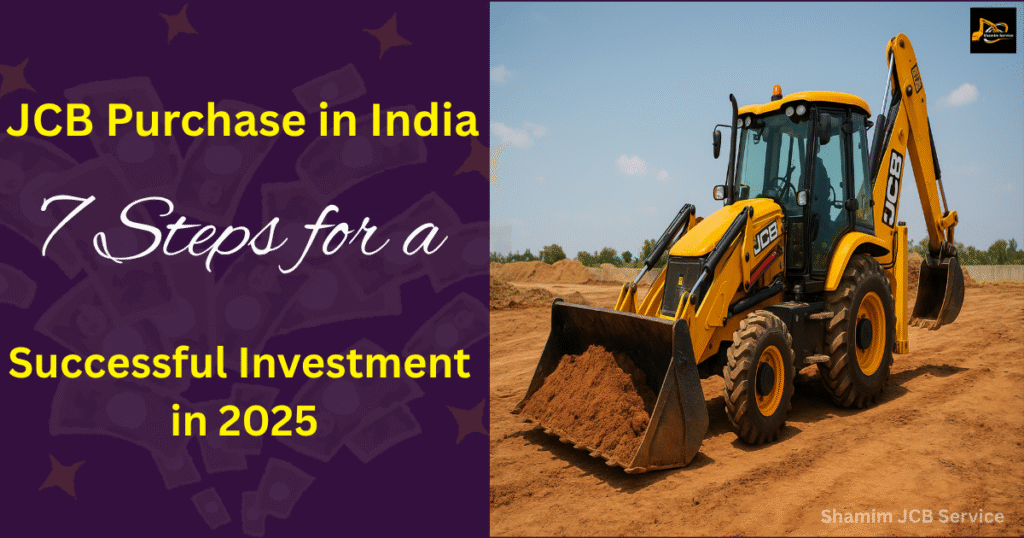
JCB machines play a big role in building India. From digging the ground to lifting heavy materials, they help in almost every construction and earthmoving job. Because of their strength and reliability, JCBs are seen working everywhere in cities, villages, and road projects across the country.
Buying a JCB is not a small step. It’s a big investment that needs proper planning and knowledge. Many people want to own one, but they are often confused about cost, types, and how to buy the right model.
This complete guide on JCB purchase in India is made to help you understand everything clearly from choosing the best machine to knowing the process, finance options, and maintenance tips. The aim is to educate and inform, not to sell.
Understanding What a JCB Is
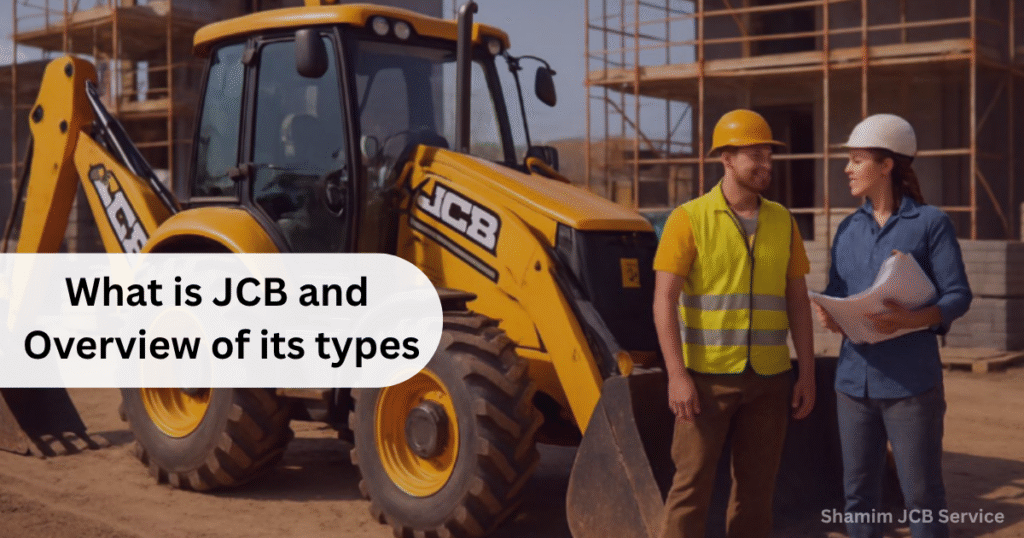
Many people in India use the word “JCB” for any digging machine. But in reality, JCB is a brand name of a British company called J.C. Bamford Excavators Limited. Over time, the name became so popular that people started using “JCB” as a common word for backhoe loaders and other earthmoving machines. Understanding this difference is important before making a JCB purchase in India, so buyers know exactly what brand and model they are investing in.
JCB makes many types of machines used for construction and farming work. Some of the most common ones are:
- Backhoe Loader: The most popular JCB machine. It has a loader in the front and a digging bucket at the back.
- Excavator: Used for deep digging and lifting heavy materials at large sites.
- Mini Excavator: Smaller in size, perfect for tight spaces or small projects.
- Skid Steer Loader: A compact and powerful machine used for loading, cleaning, and small construction jobs.
In India, JCB machines are used for many purposes like building houses, making roads, land leveling, and even in farms for lifting and digging tasks.
Understanding these types helps buyers make the right choice during a JCB purchase in India, based on their work and area needs.
Why People Buy JCBs in India
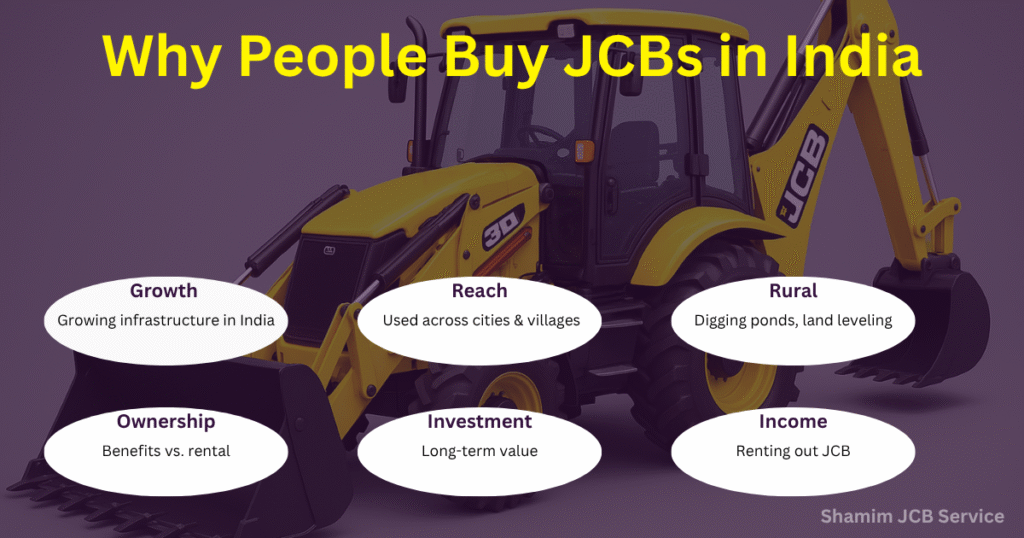
India’s rapid growth in roads, housing, and construction has increased the demand for reliable machines. From cities to villages, JCBs support projects like land leveling, digging, and farming. Many contractors now prefer JCB purchase in India over rentals for better control, long-term use, and higher returns.
Buying a JCB is also seen as a long-term investment. These machines have a good resale value and can run for many years with proper care. Many owners even earn money by giving their JCB on rent when it’s not in use.
So, a JCB purchase in India is not just about buying a machine it’s about building a steady source of work and income for the future.
Key Factors to Consider Before Buying a JCB
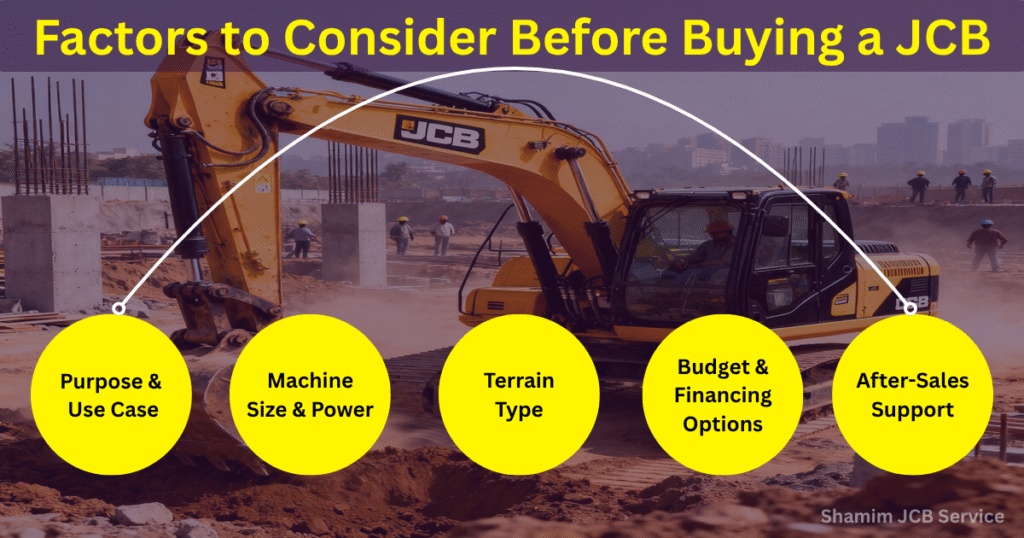
Before making a JCB purchase in India, it’s important to think carefully about your needs and working conditions. A little planning can help you choose the right model and avoid extra costs later. Here are some key points to look at:
1. Purpose & Use Case
Think about why you need a JCB.
- For foundation work or digging, a backhoe loader or excavator is best.
- For loading soil or sand, you may need a loader with strong lifting power.
- For agriculture or land leveling, smaller models or mini excavators are more suitable.
Choosing the right type ensures better performance and saves fuel.
2. Machine Size & Power
JCB machines come in different sizes and power levels.
- Light models are easier to handle and fit for small jobs or farms.
- Heavy-duty models are used in large construction or road projects.
Pick the one that matches your daily workload and job type.
3. Terrain Type
The ground condition also matters.
- For rural or uneven land, you need a machine with strong tyres and balance.
- For hilly or rocky areas, go for a more powerful model with better grip.
- For flat construction sites, a standard backhoe works well.
4. Budget & Financing Options
A JCB purchase in India requires smart budgeting. Decide whether to pay upfront or choose easy EMI options. Many banks and JCB Finance offer flexible loans, helping you buy the right machine without financial stress.
5. After-Sales Support & Service Network
Always check the service and parts availability in your area. A strong JCB service network ensures your machine stays in good condition and runs smoothly for years. Good after-sales support can save you time and money in the long run.
Types of JCB Machines Available in India
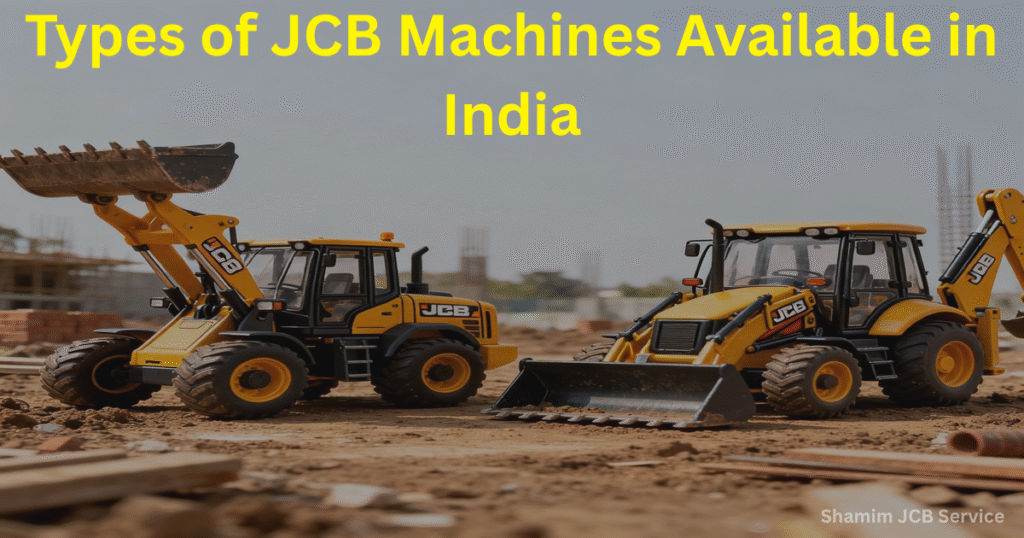
Before making a JCB purchase in India, it’s important to know the different types of JCB machines. Each type is made for specific work from digging deep soil to lifting heavy loads. Here’s a simple look at the main types and what they do:
1. Backhoe Loaders
The most common and popular JCB machine in India.
- Example Models: JCB 3DX, JCB 4DX
- Use: Digging, loading soil, road work, and foundation work
- Why Popular: It has two tools a loader in front and a backhoe at the back. Great for multipurpose jobs.
2. Excavators
Big machines used for heavy-duty digging and lifting.
- Example Models: JCB JS81, JCB NXT 140, JCB NXT 205
- Use: Large construction sites, mining, and demolition work
- Why Popular: Powerful engine and long arm reach for deep digging.
3. Mini Excavators
Small but strong machines, perfect for tight spaces or smaller projects.
- Example Models: JCB 30Plus, JCB 50Z, JCB 55Z
- Use: House construction, small plots, and garden digging
- Why Popular: Easy to move, fuel-efficient, and low maintenance.
4. Skid Steer Loaders
Compact loaders made for quick movement and short tasks.
- Example Models: JCB 135, JCB 155
- Use: Cleaning debris, loading sand, or working in narrow spaces
- Why Popular: Easy to handle and works well on small sites.
5. Telehandlers
Machines made for lifting materials to higher places.
- Example Models: JCB 530-70, JCB 540-170
- Use: Warehouses, building sites, and large storage areas
- Why Popular: Can lift heavy items up high with great balance and safety.
| Machine Type | Example Models | Power (Approx.) | Price Range (₹) | Main Use |
| Backhoe Loader | 3DX, 4DX | 75–100 HP | 30–45 Lakh | Multi-purpose digging & loading |
| Excavator | JS81, NXT 140 | 80–150 HP | 35–90 Lakh | Heavy digging & lifting |
| Mini Excavator | 30Plus, 50Z | 25–50 HP | 20–35 Lakh | Small sites & house projects |
| Skid Steer Loader | 135, 155 | 40–50 HP | 20–30 Lakh | Cleaning & short-distance loading |
| Telehandler | 530-70, 540-170 | 75–100 HP | 45–60 Lakh | Lifting at heights |
Simple Comparison Chart(Note: Prices are approximate and may change by location and dealer.)
Understanding the Cost of Owning a JCB
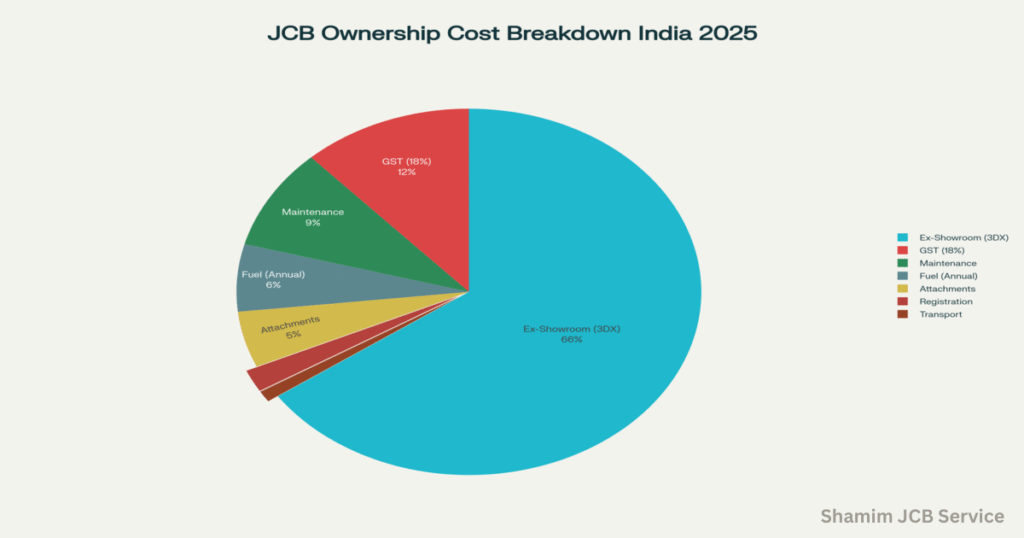
Before making a JCB purchase in India, it’s important to know that the total cost is more than just the machine’s price. There are many extra expenses that come after buying, such as tax, insurance, and maintenance. Let’s understand each part step by step.
1. Ex-Showroom Price vs. On-Road Cost
The ex-showroom price is the cost of the JCB at the dealer before adding any extra charges.
The on-road cost includes everything GST, insurance, registration, and sometimes transport charges.
This final price is what you actually pay to take the machine home.
2. GST & Insurance Impact
A Goods and Services Tax (GST) of around 18% is usually added to the base price of a JCB.
Next comes insurance, which covers the machine against damage or accidents.
Insurance is a small but important yearly cost that protects your investment.
3. Registration Charges & RTO Requirements
Just like cars or trucks, a JCB also needs to be registered with the Regional Transport Office (RTO).
You’ll need to pay registration fees and get a valid number plate.
Some states may also ask for a fitness certificate or inspection before use.
4. Maintenance, Fuel, and Spare Parts Cost
Running a JCB includes regular care and servicing.
- Fuel costs depend on daily usage diesel is the main expense.
- Maintenance like oil changes, filter replacements, and tire checks should be done on time.
- Spare parts should always be bought from authorized dealers to keep the machine safe and strong.
Regular care helps your JCB last longer and perform better.
5. Depreciation & Resale Value
Over time, every machine loses some value — this is called depreciation.
However, JCB machines hold their value well compared to other brands.
If maintained properly, you can sell your old JCB at a good price later.
This is one reason why many people see a JCB purchase in India as a smart, long-term investment.
JCB Purchase Process in India (Step-by-Step)
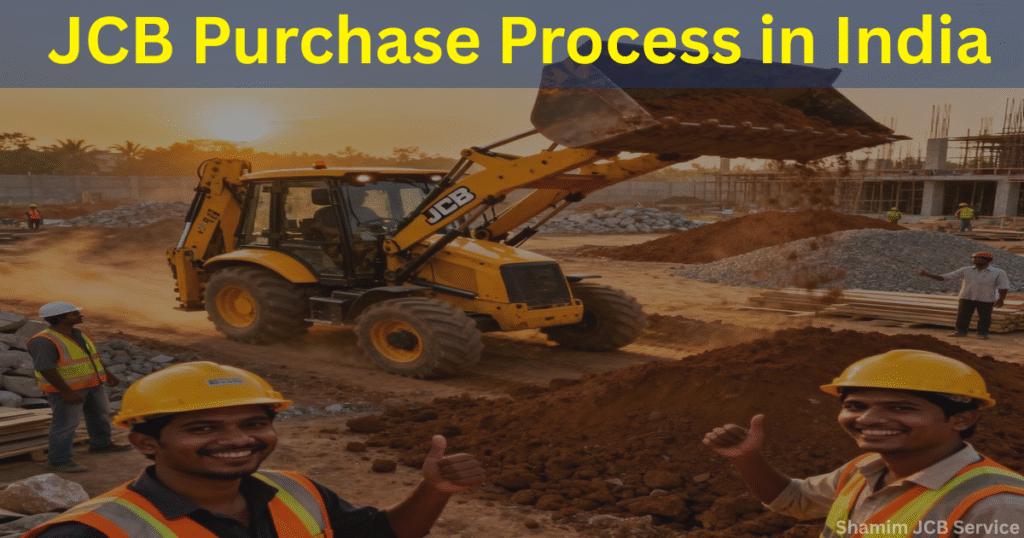
Buying a JCB machine is a big step, so it’s important to follow the right process. Here’s a simple step-by-step guide to help you through your JCB purchase in India — from choosing the dealer to getting your machine delivered safely.
Step 1: Find an Authorized JCB Dealer
Start by visiting the official JCB India website to find an authorized dealer near your city.
Authorized dealers sell genuine JCB machines, offer test drives, and provide warranty and service support.
Avoid unknown sellers or middlemen, as they may sell fake or used machines without warranty.
Step 2: Check Model Availability and Book a Demo
Before finalizing your JCB purchase in India, visit an authorized dealer and test models like JCB 3DX or 4DX. A demo helps you choose the right size, power, and comfort for your work needs.
Step 3: Loan and EMI Options
Most people use financing to buy a JCB. You can apply for a loan through JCB Finance or through banks like SBI, HDFC, or Axis Bank.
Loans usually cover up to 85–90% of the machine’s price.
You’ll then pay the rest as a down payment, followed by easy EMIs every month.
Step 4: Submit Required Documents
You’ll need to share some documents during the buying or loan process, such as:
- Aadhaar card or PAN card (ID proof)
- Business license or shop registration
- Address proof
- Bank statement or ITR (for income proof)
- Passport-size photographs
Having all these ready makes the process faster.
Step 5: Delivery, Registration, and Warranty
After payment and approval, the dealer will schedule your machine delivery.
Make sure you get:
- RTO registration papers and number plate
- Warranty card and service booklet
- User manual for operation and safety guidelines
Once delivered, your new JCB is ready to work!
Financing and Loan Options for JCB
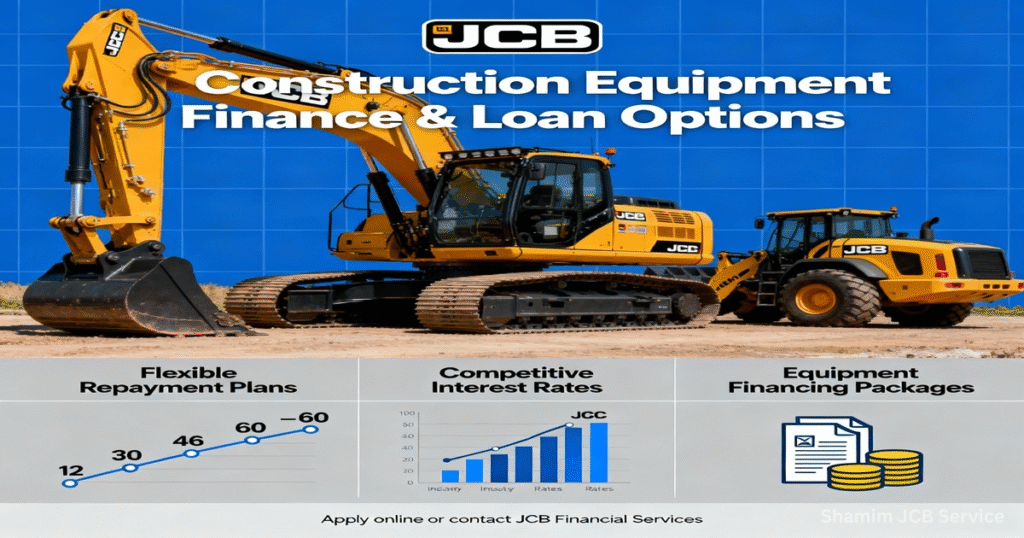
A JCB purchase in India often needs financial help because the machine price can be quite high. Luckily, there are many loan and finance options available to make the buying process easier. Let’s understand them one by one.
1. JCB Finance and Leading Bank Options
JCB has its own finance service called JCB Finance, which helps buyers get loans directly from the company. It offers quick approvals, flexible EMIs, and simple paperwork.
Apart from that, many banks and financial institutions in India also provide JCB loans, such as:
- State Bank of India (SBI)
- HDFC Bank
- Axis Bank
- ICICI Bank
- IDFC First Bank
You can compare their offers and choose the one that fits your budget and repayment comfort.
For reference to equipment financing norms, please once check the Reserve Bank of India (RBI) MSME Loan Policy
2. Interest Rates and Repayment Periods
The interest rate for JCB loans usually ranges between 10% to 14% per year, depending on your credit profile and the bank’s policy.
Most repayment periods last from 3 to 5 years, but some banks may allow longer plans.
Shorter EMIs mean faster ownership, while longer EMIs reduce monthly burden so choose what suits your income flow best.
3. Factors That Affect Loan Approval
Loan approval for a JCB purchase in India depends on key factors like a good credit score, registered business, higher down payment, and a clean repayment history.
4. Tips to Reduce EMI Burden
Here are a few smart ways to make your loan easier to manage:
- Pay a larger down payment to reduce EMI pressure.
- Choose seasonal repayment if your income depends on project work.
- Compare loan offers before finalizing one.
- Pay EMIs on time to maintain a good credit score for future loans.
Legal Requirements and Licensing
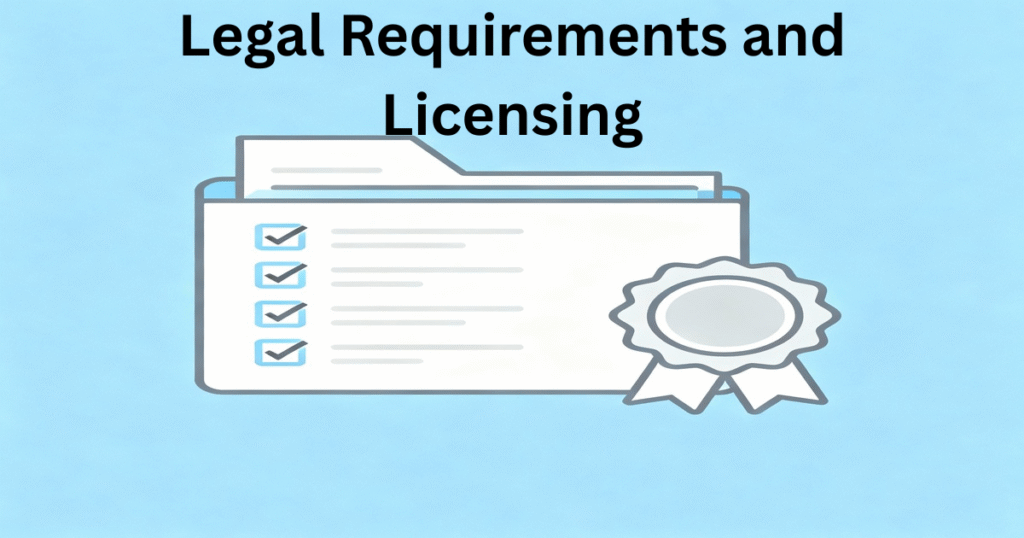
Before completing a JCB purchase in India, it’s important to understand the legal side of owning and operating the machine. Following these rules keeps your business safe and avoids future problems.
1. RTO Registration Process
Just like cars and trucks, every JCB must be registered with the Regional Transport Office (RTO).
When you buy a new JCB, the dealer usually helps you complete this process.
You’ll need to submit:
- Invoice and purchase documents
- ID proof and business details
- Insurance papers
Once done, your JCB will get a registration number and RC book, proving that it’s legal to operate on roads and job sites.
2. Operator License Requirements
Operating a JCB is not the same as driving a regular vehicle.
The person running the machine must have a Heavy Equipment Operator License or a valid heavy motor vehicle license (depending on state rules).
Many construction companies also prefer operators who have completed training from JCB’s authorized training centers this improves safety and machine care.
3. Safety and Compliance Laws
Construction and earthmoving sites in India must follow basic safety rules under the Factories Act and local government regulations.
Some important points include:
- Operators must wear helmets, gloves, and safety shoes.
- Only trained people can handle JCB machines.
- Machines should be checked regularly for leaks or faults.
Following these laws ensures safer work conditions and avoids fines during inspections.
4. Insurance Types for JCB
Insurance is a must when you own a JCB. There are mainly two types:
- Third-Party Insurance: Covers damage caused by your JCB to another person’s property or vehicle.
- Comprehensive Insurance: Covers both third-party damage and your own JCB in case of accidents, theft, or natural disasters.
Though comprehensive insurance costs more, it provides better protection and peace of mind for your JCB purchase in India.
Maintenance & Servicing Guide
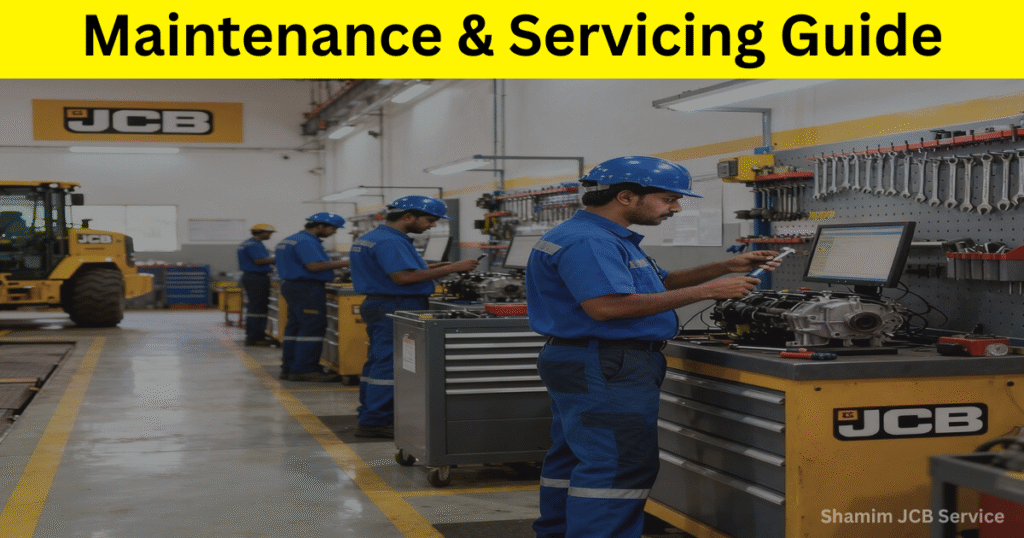
Buying a JCB is just the first step keeping it in good condition is what truly decides how long it will serve you. Proper care not only improves performance but also increases the resale value of your JCB purchase in India.
1. Regular Maintenance Schedule
Every JCB comes with a recommended service schedule based on hours of usage, not just time.
- After every 250 hours – Check oil, filters, and hydraulic fluid.
- After 500–1,000 hours – Inspect tires, engine parts, and grease fittings.
- After 2,000 hours and beyond – Full machine inspection, component cleaning, and part replacement if needed.
Following this schedule helps prevent major breakdowns and keeps the JCB ready for work.
2. Importance of Genuine Spare Parts
Always use genuine JCB parts for any replacement.
Duplicate or low-quality parts may look similar but can harm the machine’s engine or hydraulics in the long run.
Authorized JCB service centers guarantee authentic parts and skilled technicians who understand the machine’s design.
3. Common Wear-and-Tear Areas
Some parts of a JCB face more stress than others. Keep an eye on:
- Hydraulic hoses and seals
- Bucket teeth and pins
- Tyres and undercarriage (for excavators)
- Filters and oil levels
Regular checks and timely replacements help reduce downtime and save money on big repairs later.
4. Digital Service Tracking & AMC Options
JCB offers digital service tracking through its official service app. Owners can check service dates, warranty status, and machine health online.
For busy contractors, Annual Maintenance Contracts (AMC) are also available. These include scheduled services, discounts on parts, and priority support making it easier to manage your fleet without daily worries.
New vs Used JCB Which One to Choose?
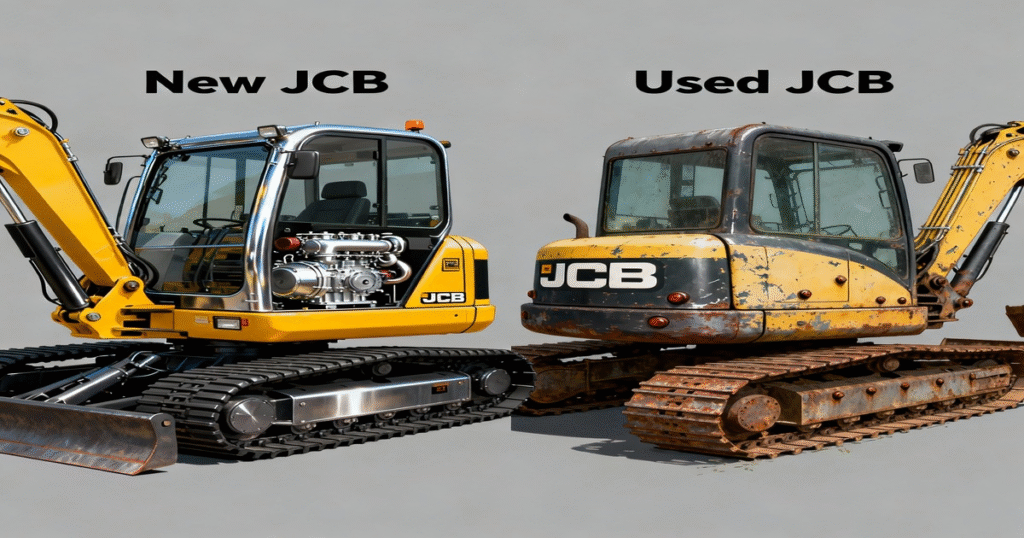
When buying a JCB, you can choose between new and used machines. Both options have pros and cons.
Pros and Cons
- New JCB:
- ✅ Full warranty and latest features
- ✅ Better fuel efficiency and lower maintenance
- ❌ Higher price
- Used JCB:
- ✅ Lower upfront cost
- ✅ Quick availability
- ❌ May need repairs, shorter warranty
Price Difference and ROI
A new JCB costs more but lasts longer with less downtime. A used one is cheaper but may need more maintenance. ROI depends on how much work you do and how well the machine is maintained.
Checklist Before Buying Used
Check these carefully:
- Engine condition and hours of usage
- Hydraulics and lifting arms
- Service record from previous owner
- Tyres, brakes, and structural damage
Where to Find Verified Used JCBs
- Authorized JCB resellers
- Certified used equipment platforms
- Trusted local dealers with service history
Buying smartly ensures your JCB purchase in India gives value for money.
Common Mistakes to Avoid While Buying a JCB
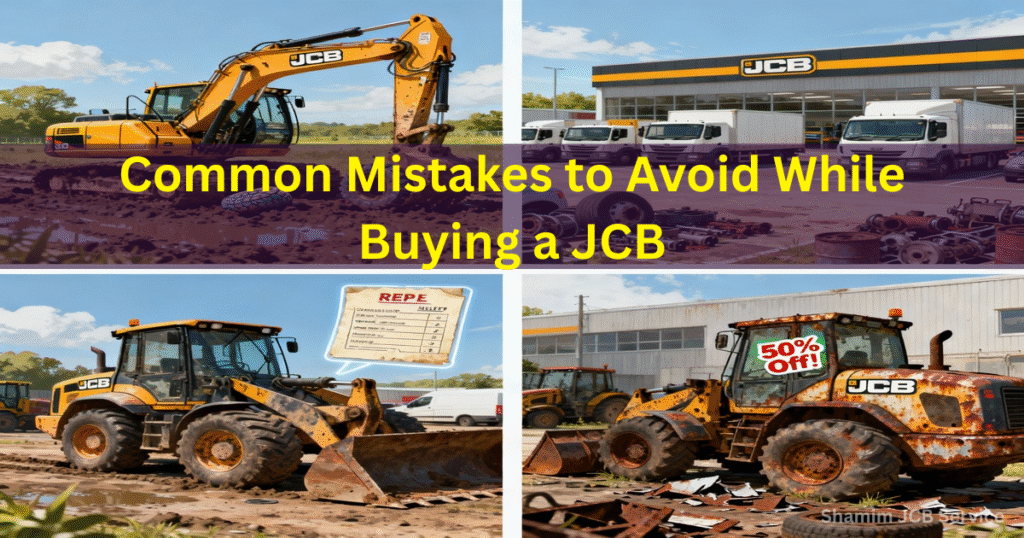
Many buyers make simple mistakes. Avoid these to save time and money:
- Ignoring terrain and job type, choose a machine suitable for your work.
- Not checking dealer authenticity, always buy from authorized dealers.
- Overlooking maintenance costs plan for fuel, parts, and servicing.
- Falling for “too cheap” offers online could be fake or unsafe machines
Being careful helps your JCB purchase in India stay safe and profitable.
Future Trends in JCB Industry in India
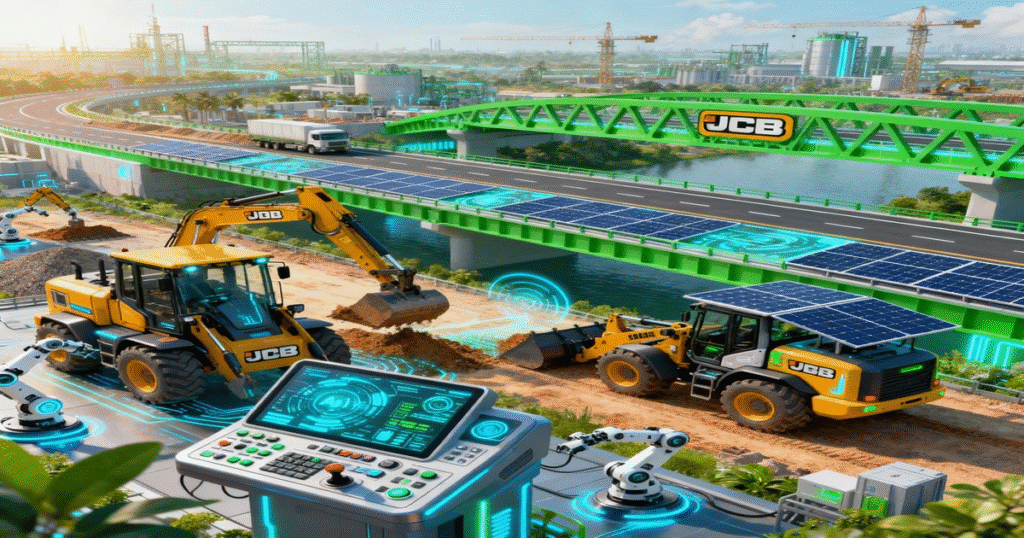
The JCB industry is changing fast:
- Electric and Hybrid Machines: Less fuel cost and eco-friendly operation.
- Smart Telematics & IoT: Machines can track usage, fuel, and maintenance digitally.
- Government Initiatives: Make-in-India and infrastructure development are increasing demand for construction machines.
Knowing these trends helps buyers plan future investments wisely.
FAQs on JCB Purchase in India
What is the average price of JCB in India?
Price varies by model. Small machines start around ₹20 lakh, while heavy-duty models can go above ₹90 lakh.
How to apply for JCB finance in India?
Apply through JCB Finance or banks like SBI, HDFC, Axis. Prepare ID, business documents, and bank statements.
Is buying a used JCB a good idea?
Yes, if it is well-maintained, has a clear service record, and you buy from verified sellers.
What documents are needed to purchase a JCB?
ID proof, business license, address proof, bank statements or ITR, and photographs.
Which JCB model is best for small contractors?
Mini excavators or small backhoe loaders like JCB 3DX or 30Plus are ideal for small projects.
Conclusion
A JCB purchase in India is a big decision. Understanding machine types, costs, financing, legal rules, and maintenance is key.
Before buying:
- Evaluate your work type and terrain
- Compare new and used machines
- Check dealers and service support
With careful planning and knowledge, your investment can be safe, efficient, and profitable. For updated information, always check the official JCB India website or visit local authorized dealers.